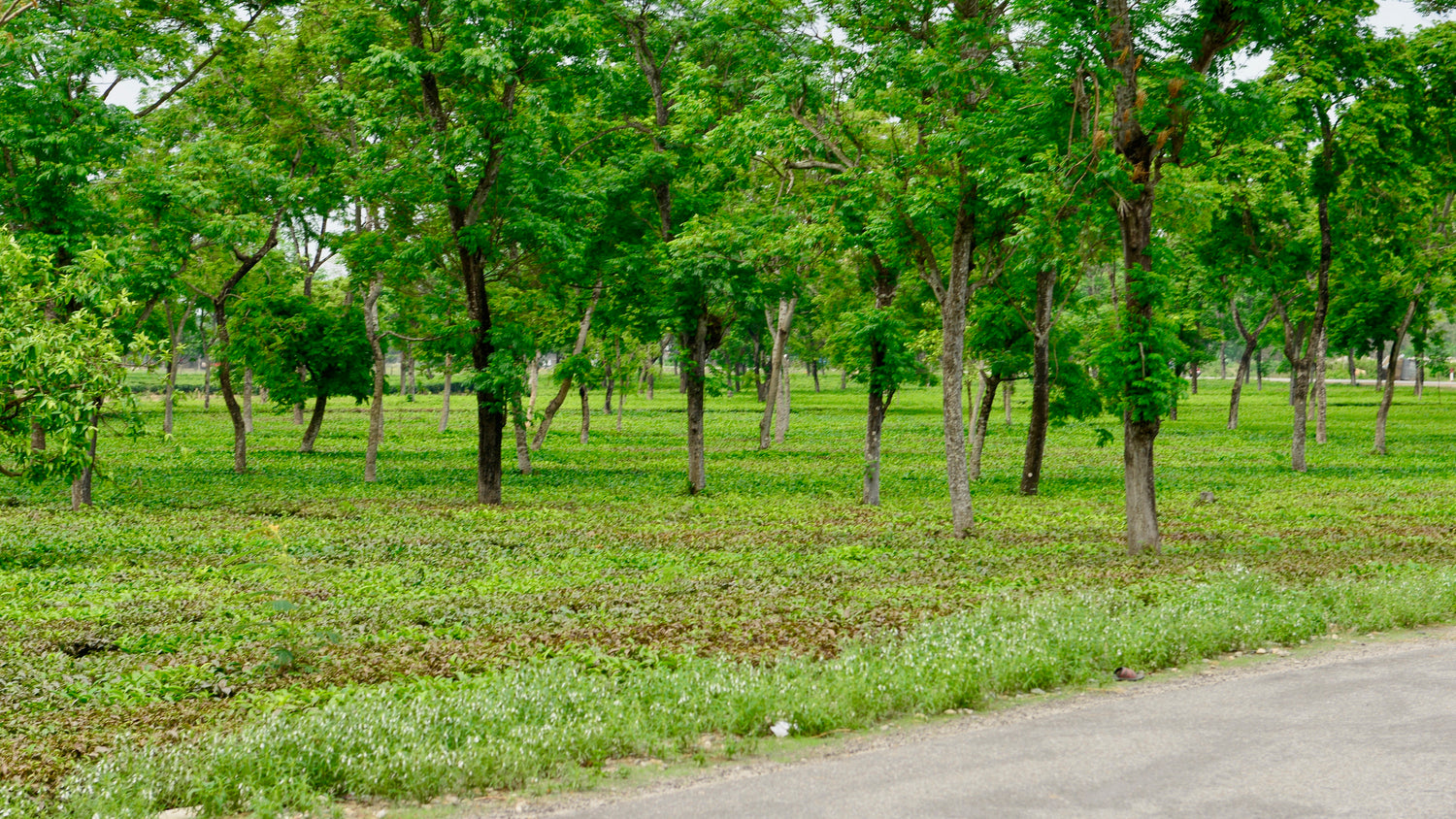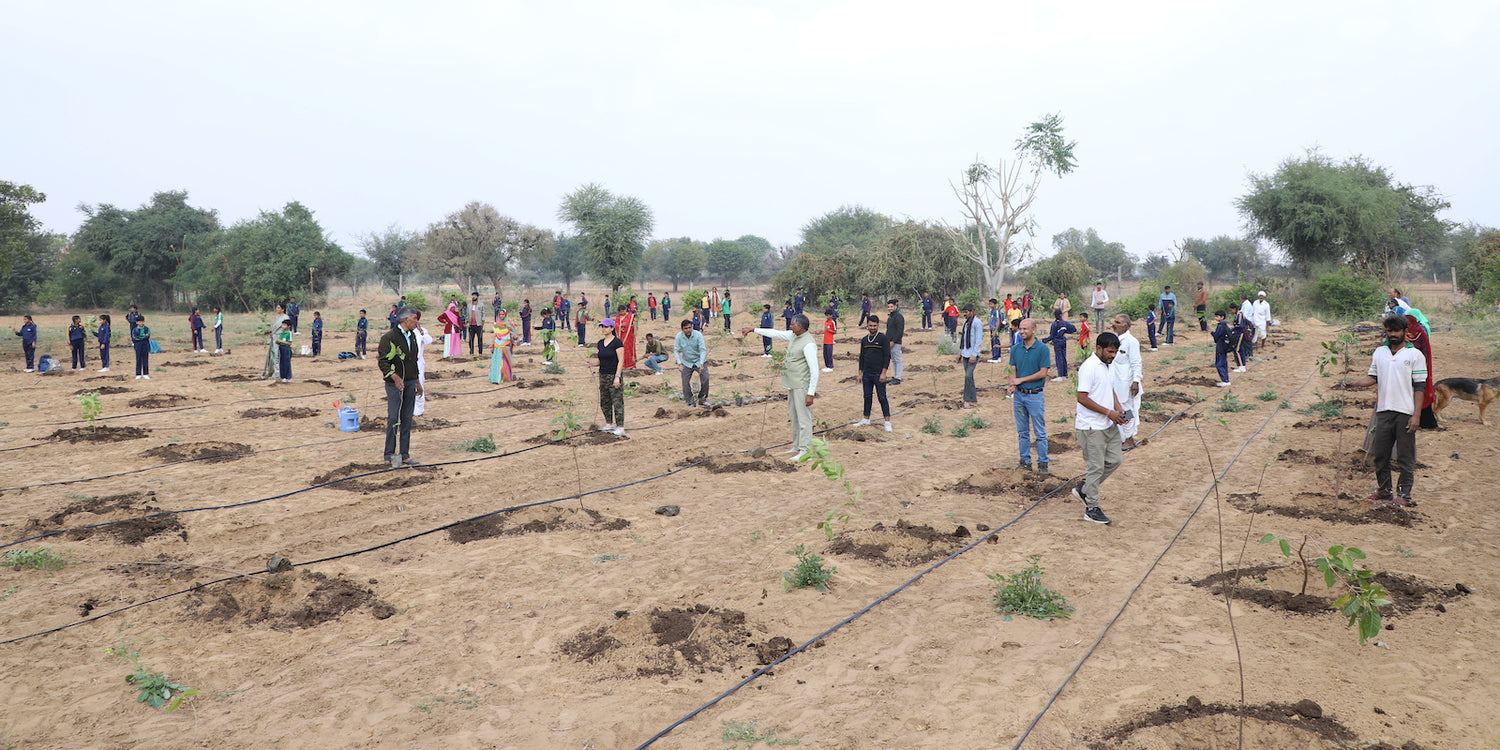Agroforestry in Kerala: A Tropical Model for Sustainable Farming
Kerala, often called "God’s Own Country," is renowned for its lush green landscapes, diverse biodiversity, and agrarian traditions. Nestled between th Read more
Connect with us
-
👥 Corporates
If you are looking for:
- 🌲 Tree Plantation Events
- 📊 CSR Projects
📧 corporate@growbilliontrees.com
📞 +91 9699723523
💬 +91 9325931304 WhatsApp (Only)
🕒 Mon - Sat | 10am - 7pm IST
-
🧩 Tree Plantation NGOs
If you are looking for:
- 💰 Financial Assistance
- 🤝 Operational Support
📧 support@growbilliontrees.com
📞 +91 9699723523
💬 +91 9325931304 WhatsApp (Only)
🕒 Mon - Sat | 10am - 7pm IST
-
🌼 Individuals
If you are looking for:
- 👥 Group Tree Plantation Drive
- 🌳 Bulk Tree Plantation
📞 +91 9699723523
💬 +91 9325931304 WhatsApp (Only)
🕒 Mon - Sat | 10am - 7pm IST
Trending
Trees for Corporates
Agroforestry in Kerala: A Tropical Model for Sustainable Farming
Kerala, often called "God’s Own Country," is renowned for its lush green landscapes, diverse biodiversity, and agrarian traditions.
Nestled between the Western Ghats and the Arabian Sea, this tropical paradise is perfectly suited for agroforestry, a sustainable farming practice that integrates trees with crops and livestock.
Agroforestry in Kerala offers a unique model for sustainable agriculture, enhancing farmer livelihoods, conserving biodiversity, and mitigating climate change.
Historical Context of Agroforestry in Kerala
Agroforestry in Kerala is deeply rooted in tradition. Ancient farming communities practiced home gardening, a system that combined fruit trees, spices, vegetables, and medicinal plants in their homesteads.
Historical records and texts, including Sangam literature, highlight the harmonious relationship between farming and forestry in Kerala.
The concept of the sacred groves (Kaavu), preserved for spiritual and ecological purposes, reflects how trees have always been integral to Kerala’s cultural ethos.
The Need for Agroforestry in Kerala
1. Restoring Degraded Land
Kerala’s growing population and urbanization have led to deforestation and soil degradation. Agroforestry systems help restore degraded lands by enriching soil fertility and preventing erosion.
2. Enhancing Livelihoods
With limited agricultural land, Kerala’s smallholder farmers benefit from agroforestry’s multiple income streams, including timber, fruits, and non-timber forest products like spices and honey.
3. Increasing Green Cover
Agroforestry contributes to India’s Green India Mission, enhancing Kerala’s green cover and helping preserve its unique biodiversity.
4. Climate Resilience
Kerala faces increasing challenges from climate change, including erratic rainfall and floods. Agroforestry buffers against these impacts, improving the resilience of farming systems.
Scientific Benefits of Agroforestry
- Soil Health Improvement: Trees like Jackfruit and Coconut enrich the soil with organic matter and reduce erosion.
- Water Conservation: Tree roots increase groundwater recharge and reduce water runoff, vital for Kerala’s sloping terrains.
- Carbon Sequestration: Agroforestry systems in Kerala act as effective carbon sinks, storing up to 50 tons of carbon dioxide per hectare annually.
Common Agroforestry Practices in Kerala
1. Home Gardens
Kerala’s home gardens are exemplary agroforestry systems, blending coconut palms, banana trees, pepper vines, and vegetable crops. These gardens provide food, timber, and economic stability.
2. Horti-Silviculture
This system integrates fruit trees like Mango and Papaya with timber species, creating a sustainable source of nutrition and income for farmers.
3. Silvo-Pastoral Systems
Combining trees and grasses, this system supports livestock while stabilizing soil and conserving water in Kerala’s hilly regions.
4. Spice-Based Agroforestry
Spices like Pepper, Cardamom, and Nutmeg are cultivated alongside tree species, reflecting Kerala’s reputation as India’s spice capital.
Fun Facts About Agroforestry in Kerala
- World-Class Coconut Farming: Kerala leads India in coconut production, with agroforestry boosting its integration with crops like pepper and banana.
- Home Garden Champions: Kerala’s home gardens are globally recognized as a sustainable agroforestry model, balancing biodiversity and productivity.
- Jackfruit Pride: Declared the state fruit of Kerala, jackfruit is a staple in agroforestry systems, offering nutrition, timber, and fodder.
Environmental Impact of Agroforestry in Kerala
1. Preventing Soil Erosion
Kerala’s sloping terrains are prone to erosion. Agroforestry stabilizes soil, reducing erosion by up to 60%, particularly in high-rainfall areas.
2. Supporting Biodiversity
Agroforestry farms in Kerala serve as mini-forests, supporting pollinators, birds, and small mammals while conserving native flora and fauna.
3. Combating Climate Change
By sequestering carbon and reducing deforestation, agroforestry systems in Kerala mitigate the effects of global warming.
4. Enhancing Air Quality
Agroforestry reduces air pollution by acting as natural filters, improving the quality of life in rural and peri-urban areas.
Challenges in Agroforestry Adoption
-
Land Fragmentation Kerala’s small and fragmented landholdings make it challenging to implement large-scale agroforestry systems.
-
Market Barriers Farmers face difficulties accessing markets for timber and non-timber products, affecting profitability.
-
Awareness and Training Lack of awareness about agroforestry’s long-term benefits hinders its adoption among smallholder farmers.
-
Climate Risks Erratic weather patterns and floods pose challenges to maintaining agroforestry systems in vulnerable areas.
Grow Billion Trees: Pioneering Agroforestry in Kerala
Grow Billion Trees is transforming Kerala’s agricultural landscapes through innovative agroforestry projects that prioritize sustainability, biodiversity, and farmer welfare.
Collaborations
- Partnering with local communities and NGOs to restore degraded lands and promote agroforestry practices.
- Collaborating with agricultural universities to develop models suited to Kerala’s tropical climate.
Execution Strategies
- Tree Nurseries: Establishing nurseries to supply saplings of species like Coconut, Jackfruit, and Mango to farmers at subsidized rates.
- Farmer Training Programs: Conducting workshops to educate farmers about agroforestry systems and their ecological and economic benefits.
- Market Linkages: Connecting farmers with spice and timber industries to ensure fair pricing and steady demand for agroforestry products.
Awareness and Advocacy
- Promoting the benefits of agroforestry through social media campaigns and community outreach programs.
- Sharing success stories of farmers who have benefited from adopting agroforestry practices.
Key Achievements by Grow Billion Trees
- Tree Plantation Drives: Over 5 million trees planted across Kerala, increasing green cover and restoring biodiversity.
- Farmer Empowerment: Enabled 10,000+ farmers to adopt agroforestry, improving their incomes by up to 40%.
- Carbon Sequestration: Agroforestry projects in Kerala under Grow Billion Trees have sequestered over 500,000 tons of carbon dioxide.
Future Prospects
By 2030, agroforestry in Kerala has the potential to:
- Increase the state’s green cover by 20%, contributing to India’s environmental goals.
- Restore 1 million hectares of degraded land, enhancing agricultural productivity and biodiversity.
- Support over 50,000 farming households, ensuring economic stability and climate resilience.
Conclusion
Agroforestry in Kerala exemplifies a harmonious blend of tradition and innovation, offering solutions to some of the state’s most pressing challenges.
From its iconic home gardens to spice-based systems, Kerala’s agroforestry practices are a model for sustainable farming.
Grow Billion Trees is leading the way, empowering farmers, restoring ecosystems, and building a sustainable future. Together, these efforts are ensuring that Kerala continues to thrive as a tropical paradise, balancing agriculture and forestry in perfect harmony.
Coconut-Based Agroforestry in Kerala
Coconut palms reign supreme in Kerala, offering endless products like oil and coir while pairing beautifully with crops like pepper and banana in sustainable systems.
Home Gardens in Kerala
Globally recognized, Kerala’s home gardens mix fruit trees, spices, and vegetables in perfect harmony, creating mini-forests that provide food, income, and ecological balance.
Spice Agroforestry in Kerala
Pepper, cardamom, and nutmeg thrive alongside trees, making Kerala the spice capital of India while showcasing the true potential of agroforestry.
Jackfruit in Agroforestry
The state fruit of Kerala, jackfruit is a delicious, sustainable crop that doubles as a source of income and nutrition in agroforestry systems.
Bamboo Agroforestry in Kerala
Bamboo, the fast-growing “green gold,” offers versatility and profits, thriving in Kerala’s tropical climate and supporting agroforestry efforts.
Horti-Silviculture in Kerala
Combining mango, papaya, and timber trees, this system creates a tropical paradise that feeds families while boosting incomes.
Silvo-Pastoral Systems in Kerala
Trees and grasses join forces to support livestock and stabilize soil in Kerala’s hilly terrains, blending farming and ecology seamlessly.
Agroforestry for Soil Erosion Control
Tree roots and ground cover prevent erosion, protecting Kerala’s sloping landscapes and maintaining soil health for sustainable agriculture.
Carbon Sequestration in Kerala Agroforestry
These systems act as tropical carbon sinks, capturing greenhouse gases and turning Kerala’s farms into climate champions.
Biodiversity in Kerala Agroforestry
Agroforestry supports birds, pollinators, and wildlife, transforming farms into biodiversity hotspots while preserving native flora and fauna.
Grow Billion Trees in Kerala
Empowering farmers with training and saplings, Grow Billion Trees is greening Kerala with agroforestry models tailored for sustainability and resilience.
Agroforestry and Water Conservation in Kerala
Tree roots recharge groundwater, reduce runoff, and ensure water availability, making agroforestry a lifesaver for Kerala’s agricultural communities.
You may like
Corporate Plantations
FAQ
What is agroforestry in Kerala?
Agroforestry blends trees, crops, and livestock to enhance income and conserve ecosystems. Grow Billion Trees promotes this tropical model to boost sustainability and biodiversity in Kerala.
Why is agroforestry important in Kerala?
It restores degraded lands, combats soil erosion, and diversifies farmer incomes. Grow Billion Trees ensures agroforestry benefits farmers while preserving Kerala’s lush green cover.
How does agroforestry support Kerala’s home gardens?
Kerala’s home gardens mix trees, spices, and vegetables, creating self-sustaining ecosystems. Grow Billion Trees supports this model by providing saplings and training for improved productivity.
What role does coconut play in agroforestry?
Coconut palms are a staple in Kerala, offering oil, coir, and shade for crops like pepper. Grow Billion Trees integrates coconuts into agroforestry systems to maximize their benefits.
How does agroforestry improve biodiversity in Kerala?
Agroforestry farms act as mini-forests, supporting pollinators, birds, and native species. Grow Billion Trees designs systems that balance farming with biodiversity conservation.
Can agroforestry help fight climate change in Kerala?
Yes, agroforestry systems sequester carbon and reduce greenhouse gases. Grow Billion Trees scales up projects in Kerala to amplify their climate benefits.
What is spice-based agroforestry in Kerala?
Spices like pepper and cardamom are cultivated alongside trees, boosting incomes and maintaining soil health. Grow Billion Trees encourages spice agroforestry to support Kerala’s spice legacy.
How does agroforestry prevent soil erosion in Kerala?
Tree roots stabilize soil and reduce runoff, protecting Kerala’s sloping terrains. Grow Billion Trees promotes erosion control through well-designed agroforestry systems.
How does agroforestry conserve water in Kerala?
Trees recharge groundwater and reduce evaporation, ensuring sustainable water use. Grow Billion Trees promotes agroforestry as a solution for Kerala’s water needs.
What challenges do Kerala farmers face with agroforestry?
Land fragmentation and market access are common hurdles. Grow Billion Trees addresses these issues by offering training and connecting farmers to markets.
How does Grow Billion Trees support agroforestry in Kerala?
We plant trees, train farmers, and build market linkages, ensuring agroforestry thrives as a sustainable model in Kerala’s tropical landscape.
Can small farmers adopt agroforestry in Kerala?
Absolutely! Small farmers benefit from diversified income and improved land use. Grow Billion Trees provides tools, training, and saplings to make agroforestry accessible for everyone.























